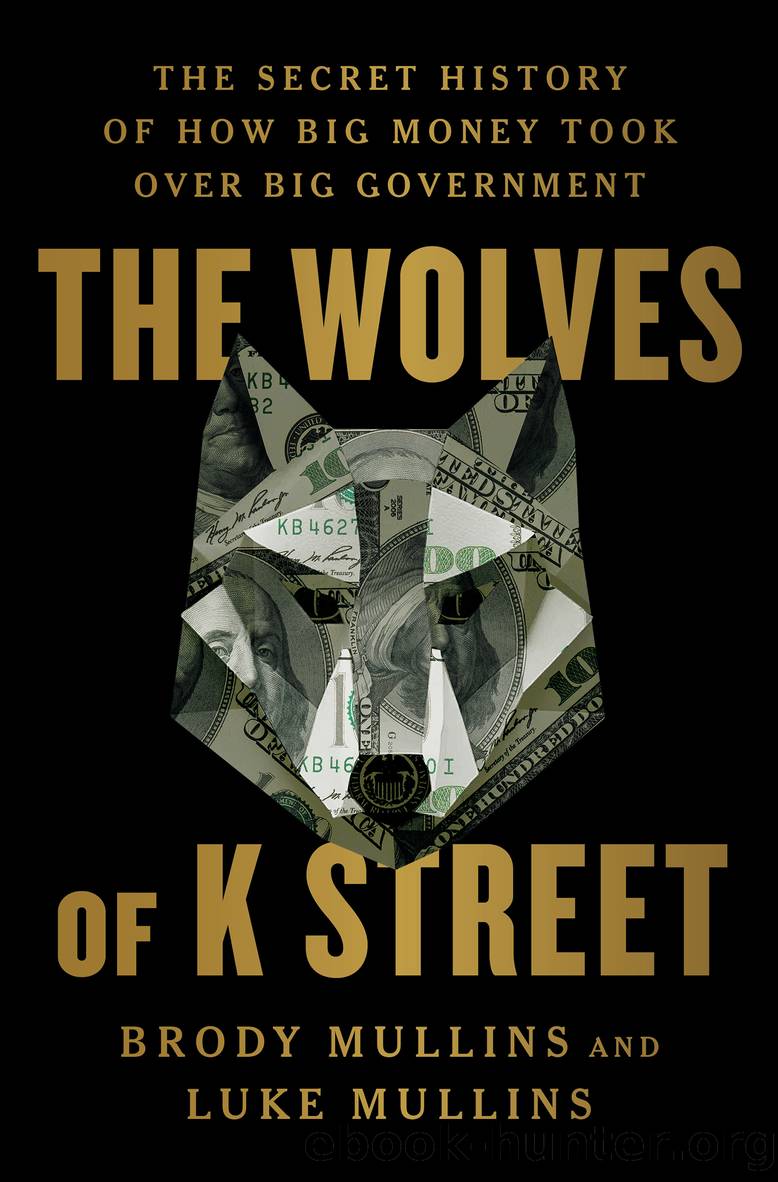The Wolves of K Street by Brody Mullins & Luke Mullins

Author:Brody Mullins & Luke Mullins
Language: eng
Format: epub
Publisher: Simon & Schuster
Published: 2024-05-07T00:00:00+00:00
13
Spring 2011
Federal Trade Commission headquarters, Washington, DC
One afternoon in the spring of 2011, the five top officials at the Federal Trade Commission gathered at the agencyâs DC headquarters for a meeting of such sensitivity that it wasnât listed on its public agenda. The FTCâs three Democratic and two Republican commissioners wore business attire as they took their places in the rounded, wood-paneled hearing room. Beside them, a coterie of agency lawyers, government economists, and other stern-faced officials settled into chairs. Located a few blocks from the US Capitol, the sturdy limestone and granite building was intended to project a stable and robust federal government during the upheaval of the Great Depression; FDR had laid the cornerstone himself in 1937.1 On either side of the building are matching limestone sculptures depicting shirtless, muscle-bound men, each restraining an angry workhorse. The sculpturesâcalled Man Controlling Tradeâare thought to symbolize the agencyâs mission to shield consumers from the abuses of corporate capitalists.2 It had been a long time, though, since the agency had lived up to its New Dealâera mandate.
After crossing paths with Tommy Boggs during the childrenâs TV advertising debate of the late 1970s, when it was derided as âThe National Nannyâ by the Washington Post, the FTC had grown increasingly accommodating to corporate empire building. By the turn of the twenty-first century, it was green-lighting some of the largest corporate mergers in American history, including the $81 billion merger of Exxon and Mobil, the $90 million merger of pharmaceutical firms Pfizer and Warner-Lambert, and the $165 billion merger of America Online and Time Warner.
Inside the agency, however, some rank-and-file bureaucrats nursed a cautious optimism that the recent election of Barack Obamaâwith his soaring calls to eradicate the influence of special interests in governmentâwould revive the FTCâs tradition of tough-minded regulation. And when they discovered the subject of the meeting that day at the agencyâs headquarters, these staffers grew even more hopeful. Unlike the general public, some FTC employees were permitted to attend the gathering. So, with a buzz of intrigue and anticipation, the staffers filed into the hearing room, found seats in the observation benches, and watched the FTC commissioners begin the proceedings.
It was the alleged actions of an iconic technology firm that had brought the federal regulators together that day. Many months earlier, the FTC had begun receiving complaints that Google, the Internet search engine giant based in Mountain View, California, had been illegally using its market power to bludgeon rivals, smother competition, and harm consumers.
Internet competitors, such as Yelp Inc. and Tripadvisor Inc., had accused Google of stealing its content by copying information from their online reviews, while Amazon.com claimed that the company generated search results that unfairly steered users to Google-owned products and services. The meeting was convened so that the FTCâs five commissioners could consider authorizing a formal antitrust investigation into Googleâs business practices, a decision that could very well lead to an antitrust lawsuit against the company. Bringing an antitrust case against Google would send an unmistakable
Download
This site does not store any files on its server. We only index and link to content provided by other sites. Please contact the content providers to delete copyright contents if any and email us, we'll remove relevant links or contents immediately.
The Secret History by Donna Tartt(19086)
The Social Justice Warrior Handbook by Lisa De Pasquale(12190)
Thirteen Reasons Why by Jay Asher(8909)
This Is How You Lose Her by Junot Diaz(6886)
Weapons of Math Destruction by Cathy O'Neil(6279)
Zero to One by Peter Thiel(5801)
Beartown by Fredrik Backman(5754)
The Myth of the Strong Leader by Archie Brown(5507)
The Fire Next Time by James Baldwin(5442)
How Democracies Die by Steven Levitsky & Daniel Ziblatt(5218)
Promise Me, Dad by Joe Biden(5153)
Stone's Rules by Roger Stone(5087)
A Higher Loyalty: Truth, Lies, and Leadership by James Comey(4962)
100 Deadly Skills by Clint Emerson(4925)
Rise and Kill First by Ronen Bergman(4788)
Secrecy World by Jake Bernstein(4753)
The David Icke Guide to the Global Conspiracy (and how to end it) by David Icke(4717)
The Farm by Tom Rob Smith(4507)
The Doomsday Machine by Daniel Ellsberg(4490)
